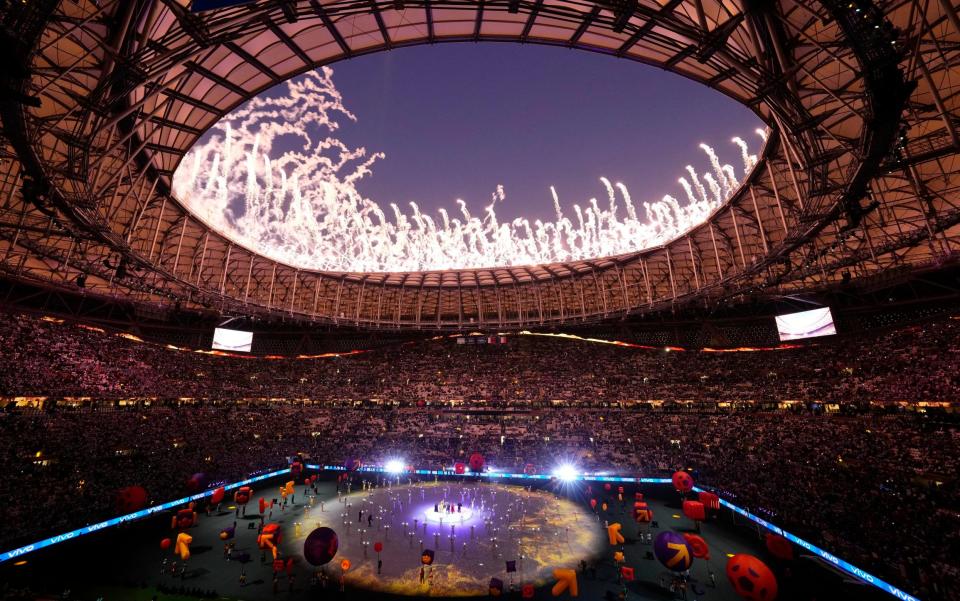Qatar closes in on £800m deal to host rugby’s Nations Championship finals for eight years

Qatar is closing in on an £800 million eight-year deal to host the finals of rugby’s Nations Championship after being granted exclusive negotiating rights.
Qatar’s Supreme Committee for Delivery and Legacy has entered a two-month exclusivity period with Six Nations Rugby and SANZAAR, the two governing bodies who own and will operate the new tournament, which is planned to begin in 2026.
World Rugby announced the creation of a biennial Nations Championship last October with the Six Nations to tour the southern hemisphere for three matches every other summer before playing three home games against the other southern hemisphere sides in the autumn, but did not confirm any plans for a finals series.
Qatar made its initial pitch to stage a six-match finals series involving all 12 tier-one nations last month, and after fielding a series of questions from the unions, the nation has now been given the green light to proceed. In what has been labelled in the bid documents as a “Super Bowl of Rugby” Qatar is proposing to create a three-day sporting festival to be held every two years from November 2026 at multiple venues in Doha including Lusail Stadium, the venue for the 2022 football World Cup final.
Qatar is understood to have guaranteed Six Nations and SANZAAR £800 million in revenue over the first four editions of the finals series, an extremely attractive proposition given the parlous state of many of the union’s finances. The funding for such lucrative appearance and prize money is already largely in place through agreements with Qatar Airways to come on board as title sponsors and a deal with marketing company Pitch International to sell the global TV rights for the finals, and six group matches to be played by each nation which will precede them every other year.
A number of other Qatari companies, including the Qatar National Bank and Qatar Energy, are understood to have expressed interest in sponsoring the finals series. The Six Nations and SANZAAR also received a rival offer put together by global sports and media company IMG, but have opted to pursue the Qatari option at this stage.
The 12 unions are understood to have signed non-disclosure agreements so were unable to comment when contacted.
The Qatari proposals would see the top-ranked European team following the six group matches face the leading southern hemisphere team in a grand final to determine the Championship winners.
Going to Qatar would attract criticism
In addition, the second-ranked Six Nations side would play the second team in the southern hemisphere table, with third playing third and so on down to sixth vs sixth. Fiji and Japan are expected to join New Zealand, Australia, South Africa and Argentina in facing the European nations, with the sides being ranked on results in two six-team tables. The games would take place as double-headers on three successive days in three different stadiums in Doha building to the grand final at Lusail.
Qatar’s offer and promise of broadcasting and commercial riches is extremely attractive to the unions, many of whom are beset by financial problems and struggling to sell their own TV rights. Southern hemisphere giants New Zealand, South Africa and Australia have all posted losses totalling tens of millions of pounds in recent years, while the RFU were unable to secure a broadcast partner for England’s international against Japan later this month. A streaming website owned by World Rugby, Rugby Pass, have been given the rights meaning England’s reunion with Eddie Jones will be their first Test match not broadcast on television for decades.
While the final decision will be taken by the Six Nations and SANZAAR, World Rugby are also involved in the negotiations. The world governing body may also be tempted to support the proposal as they will take a share of the money generated to distribute to tier-two nations, as well as using the funds to help grow the sport in poorer countries.
Any new competition would require final sign off from the World Rugby Council, with the governing body keen to retain an element of promotion and relegation for smaller nations to develop.
Moving the Nations Championship finals to Qatar would attract criticism from human rights groups, but the unions’ biggest concern is whether the event would attract enough fans to travel to the Middle East. Another potential problem is the issue of player welfare as staging a finals series would involve an extra game for the 10 nations who have not reached the grand final, but the money on offer for those unions is likely to be enough to persuade them.
Plans to scrap one of the two fallow weeks in the Six Nations does at least free up the space required to stage the finals series in an already congested calendar.
A successful bid would represent Qatar’s second-biggest sporting triumph after the 2022 World Cup with the government eager to build on the perceived success of that tournament, particularly given the emergence of neighbours Saudi Arabia as a global sporting powerhouse. Next year’s World Aquatics Championships will take place in Qatar, as will the 2027 Basketball World Cup, while a bid for the 2036 Olympics is also being considered.
In addition to the financial benefits Qatar’s bid is based on the country being the perfect neutral venue given its relative accessibility to the teams and fans. The gulf state is located almost halfway home for the southern hemisphere nations who will be travelling back from Europe, has seven world-class stadiums located within a 33-mile radius of Doha, and with winter temperatures in the low 20s offers excellent playing conditions for rugby.
A Six Nations spokesperson told Telegraph Sport: “The interest and excitement for rugby’s Nations Cup continues to build, ahead of its introduction in 2026. However, we do not comment on commercial matters or engage in speculation.”
World Rugby declined to comment.

 Yahoo Sport
Yahoo Sport 






































